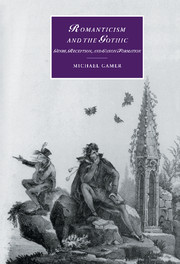Book contents
- Frontmatter
- Contents
- Acknowledgments
- List of abbreviations
- A note on the text
- Introduction: Romanticism's “pageantry of fear”
- 1 Gothic, reception, and production
- 2 Gothic and its contexts
- 3 “Gross and violent stimulants”: producing Lyrical Ballads 1798 and 1800
- 4 National supernaturalism: Joanna Baillie, Germany, and the gothic drama
- 5 “To foist thy stale romance”: Scott, antiquarianism, and authorship
- Notes
- Index
- CAMBRIDGE STUDIES IN ROMANTICISM
5 - “To foist thy stale romance”: Scott, antiquarianism, and authorship
Published online by Cambridge University Press: 22 September 2009
- Frontmatter
- Contents
- Acknowledgments
- List of abbreviations
- A note on the text
- Introduction: Romanticism's “pageantry of fear”
- 1 Gothic, reception, and production
- 2 Gothic and its contexts
- 3 “Gross and violent stimulants”: producing Lyrical Ballads 1798 and 1800
- 4 National supernaturalism: Joanna Baillie, Germany, and the gothic drama
- 5 “To foist thy stale romance”: Scott, antiquarianism, and authorship
- Notes
- Index
- CAMBRIDGE STUDIES IN ROMANTICISM
Summary
And think'st thou, Scott, by vain conceit perchance,
On public taste to foist thy stale romance,
Though Murray with his Miller may combine
To yield thy muse just half-a-crown per line?
No! when the sons of song descend to trade,
Their bays are sear, their former laurels fade.
Let such forego the poet's sacred name,
Who rack their brains for lucre, not for fame:
Still for stern Mammon may they toil in vain!
And sadly gaze on Gold they cannot gain!
Such be their meed, such still the just reward
Of prostituted Muse, and hireling bard!
(Byron, English Bards and Scotch Reviewers)As Jane Millgate, Peter T. Murphy, and John Sutherland recently have argued, the relation between popular success and artistic success in literary production – writing “for lucre … [or] for fame” – was “a subject which Scott himself could never leave completely alone.” Part of the reason for this lies with Scott's unprecedented popularity as a writer of metrical romances between 1805 and 1813. As Murphy notes, “His accomplishment remains, I think, almost unparalleled, even in our era of smash hits and giant blockbusters.” Scott's commercial success in these years made him ripe for attacks like the one above by Byron in English Bards and Scotch Reviewers, and scholars such as Sutherland have attributed the anonymity of the Waverley novels at least in part to Scott's wariness of this particular kind of attack.
- Type
- Chapter
- Information
- Romanticism and the GothicGenre, Reception, and Canon Formation, pp. 163 - 200Publisher: Cambridge University PressPrint publication year: 2000

